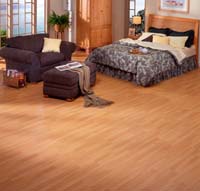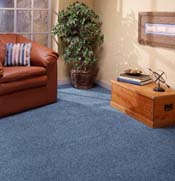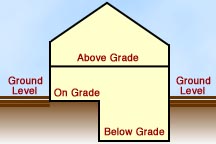|
 Which
Type of Flooring Do I Choose? (Fashions) Which
Type of Flooring Do I Choose? (Fashions)
Flooring materials are more varied than ever before, offering
a combination of fashion and function. But all those attractive new options
might leave you feeling a little confused about what best suits your needs.
If you want to install new flooring but aren’t sure what kind, keep
reading to understand some of the practical and aesthetic factors that
should influence your decision. Tom is happy
to provide this information as a service to you.
Which
Room Will It Be?
Kitchens usually have an entry door, which means
a floor will have high traffic and dirt. Spills are common, so kitchen
floors need to be easy to clean. And for safety purposes, they need to
be non-slip. Vinyl is a good choice for kitchen floors. In the event of
a dropped glass or dish, a resilient floor like vinyl has more bounce
and may prevent breakage. Keep in mind that a deeply textured pattern
may be harder to clean. Tile, laminate and wood are great kitchen floor
alternatives. Rugs and mats can soften a harder material such as tile.
Bathroom floors need to be waterproof, washable
and non-slip. Vinyl has traditionally been the floor of choice for baths. Due to excessive moisture,
some flooring materials such as laminate and wood have not been suitable
for baths, but newer versions of these products can be adapted to bathrooms.
Make sure any rugs or mats are non-slip.
 |
| Carpet
is an great choice for a living room. |
Living rooms are focal points in most homes. Their
function varies from family room to formal receiving room. Living rooms
are often the centerpiece of home furnishings. Choose flooring to match
the room’s function and décor. Carpet is an excellent choice.
Carpet offers fibers and styles that accommodate informal or formal use.
Hardwood also provides an attractive, durable option, especially with
the addition of area
rugs.
Dining room floors need to be wear- and stain-resistant,
especially if the room is used regularly at mealtime. Carpet is an option,
but light colors tend to show stains more and may not be the best choice.
Wood, laminate or tile work well in dining rooms.
Bedroom floors are usually overshadowed
by the bed and coordinating fabrics. Traffic is less of a problem here
than in other rooms, so stains and wear should be minimal. Consider a
neutral flooring that adapts to frequent décor changes. Too many
bright colors can be overpowering. Carpet is traditionally used in bedrooms.
Wood or laminate floors are good alternatives, especially if you add a
decorative rugs.
Don’t forget the hallways and stairs.
Steady traffic brings dirt and moisture, especially to entry halls and
mudrooms. Stains and wear are more visible. Look for a sturdy material
that coordinates with the rest of the flooring in the house. Entry halls
are the first part of your home a guest sees, so use this area to make
a bold statement. Inlaid patterns of wood laminate can
be dramatic and still handle traffic.
 |
| Grade
diagram |
Where
Is The Room Located?
Before you make your purchase, you need to do a little
research. Each type of flooring requires the proper substrate to work,
therefore some floors aren't recommended for all areas of the home. Is
the existing floor above grade (suspended), on grade or below grade? (see
diagram) Basements are especially susceptible to ground moisture. Both
grade level and below grade level floors have potential moisture concerns
that need to be addressed. Make sure that you buy a flooring material
suited to the grade level where the floor is to be installed. A flooring
sales specialist can tell you if the floor you like will work.
Before
You Buy - Determine:
- Will the new floor have continuity with the other flooring
in your home? Where does the floor fit in your overall decorating theme?
Will you have to redecorate the whole room to match the new floor?
- What colors match the existing room décor? Color
is a major consideration in floor selection. Light surfaces reflect
a great deal of light while darker surfaces reflect little light, requiring
more light sources. A room furnished in a light color scheme feels larger
than darker rooms. Dark-colored flooring can make a large room feel
more intimate. Stick with neutral shades to allow more colorful home
decorating or choose bold colors for impact. Keep in mind that a light
floor shows more soil than a darker floor.
- Where is the room? Does it have an outside entrance
that generates traffic? Will pets or children be running or playing
on it?
- Do you have a heated floor? Not all floor coverings
are adaptable to subfloor heating.
- What care will be involved in maintaining the floor?
Will it be easy to keep clean?
- Can you install it yourself? Are you able to recognize
and repair inadequate subflooring and underlayment? What is the amount
of preparation required? Are you able to remove and dispose of old flooring
materials? Remember that some old resilient floors contain asbestos
and require removal by a professional. If you decide not to install
it yourself, remember, Tom's fitters can have it installed
for you.
| 









